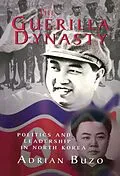Throughout the 1990s, North Korea has operated under a skeptical international eye, due largely to the countrys rigorous self-imposed isolation, its on-going confrontation with South Korea, a controversial nuclear arms program, and the near-total collapse of its economy. North Koreas leaders have chosen to face the world with its Stalinist political culture and ideological framework intact, for better or worseand by most reports, almost exclusively for the worst. How did this situation come to be, and what are its consequences? In The Guerilla Dynasty, Adrian Buzo gives us an accessible, up-to-date, and rigorously researched account of the political, economic, and foreign policy developments in North Korea since 1945.
Autorentext
Adrian Buzo
Inhalt
Preface -- The origins of the guerilla tradition -- The political institutions of the democratic people's republic of korea -- The emerging tyranny, 1958-70 -- Setbacks to socialism, 1970-80 -- The confirmation of kim jong il, 1980-83 -- Signs of reform, 1984-86? -- The democratic people's republic of korea and the collapse of the soviet bloc, 1987-91 -- A Matter of Survival, the 1990s -- Concluding remarks
